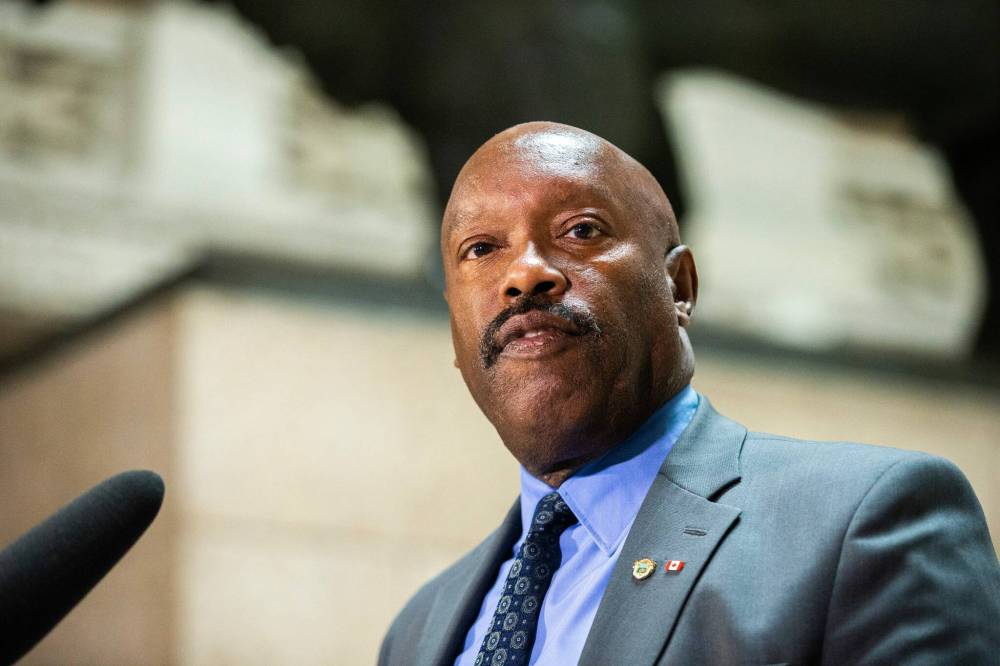City officials open to idea of police body cameras after province offers to help with costs in wake of fatal shootings
Read this article for free:
or
Already have an account? Log in here »
To continue reading, please subscribe:
Monthly Digital Subscription
$0 for the first 4 weeks*
- Enjoy unlimited reading on winnipegfreepress.com
- Read the E-Edition, our digital replica newspaper
- Access News Break, our award-winning app
- Play interactive puzzles
*No charge for 4 weeks then price increases to the regular rate of $19.00 plus GST every four weeks. Offer available to new and qualified returning subscribers only. Cancel any time.
Monthly Digital Subscription
$4.75/week*
- Enjoy unlimited reading on winnipegfreepress.com
- Read the E-Edition, our digital replica newspaper
- Access News Break, our award-winning app
- Play interactive puzzles
*Billed as $19 plus GST every four weeks. Cancel any time.
To continue reading, please subscribe:
Add Free Press access to your Brandon Sun subscription for only an additional
$1 for the first 4 weeks*
*Your next subscription payment will increase by $1.00 and you will be charged $16.99 plus GST for four weeks. After four weeks, your payment will increase to $23.99 plus GST every four weeks.
Read unlimited articles for free today:
or
Already have an account? Log in here »
Hey there, time traveller!
This article was published 03/01/2024 (703 days ago), so information in it may no longer be current.
City councillors could once again find police body cameras on their agenda now that the province has announced a willingness to cover some costs after officers shot and killed suspects in separate incidents over the past week.
Mayor Scott Gillingham and police board chair Coun. Markus Chambers said Wednesday they are open to exploring the idea again and having discussions with the province.
“The challenge for the City of Winnipeg has always been the cost,” said Gillingham. “We have budgets that are really limited.”
MIKAELA MACKENZIE / WINNIPEG FREE PRESS FILES Mayor Scott Gillingham: “We have budgets that are really limited.”
Justice Minister Matt Wiebe said he believes body cameras can increase transparency to protect everyone involved in police encounters.
“As they are implemented by police services across Manitoba, we are ready to help ensure that costs and processes associated (with) evidence disclosure and privacy are supported,” he told the Free Press in a statement Tuesday.
In response, Chambers said: “If the provincial government is willing to provide assistance and resources… that’s a conversation I would gladly have with the justice minister.”
The commitment was confirmed after University of Manitoba international student Afolabi Stephen Opaso, 19, was fatally shot by Winnipeg police in a Fort Richmond apartment on New Year’s Eve.
Jean-René Dominique Kwilu, a lawyer who represents the Opaso family in Nigeria, has said the man was experiencing a mental-health crisis.
“The challenge for the City of Winnipeg has always been the cost.”–Scott Gillingham
The Winnipeg Police Service said two officers responded to a report of a man who was acting erratically, and was possibly armed with a weapon, in a University Crescent suite where other people were present.
On Monday, police Chief Danny Smyth said the officers were confronted by a man who had two knives.
In a 26-second audio recording obtained by the Free Press, officers are heard saying “drop the knife” three times before firing three gunshots.
A U of M spokeswoman said a flag will be lowered in Opaso’s memory in time for the return of classes next week following the holiday break.
She said wellness and mental-health supports are available to students and staff, and the International Centre will offer additional assistance.
After several hours of failed negotiations to end a standoff in a Furby Street apartment last Thursday, police tactical unit officers fatally shot a man who was holding a 19-year-old woman hostage at knifepoint. The man was considered a person of interest in the slaying of a B.C. truck driver whose body was found in the same housing complex two days earlier.
The body camera discussion resurfaced in November amid an inquest into the individual deaths of five men who were in Winnipeg police custody.
Smyth is open to to the use of body cameras, a police spokeswoman said.
Gillingham said one question that needs to be asked is whether the multimillion-dollar capital and operating costs of a camera program are the best use of limited resources, or whether investment in other areas, such as mental-health services, is a better option.
In 2021, the cost of more than 1,300 cameras for Winnipeg officers was estimated at $7 million, while the annual operating cost, including digital video storage and staff, was pegged at about $4 million.
Gillingham said a very small number of incidents involve the use of force by police.
MIKAELA MACKENZIE / WINNIPEG FREE PRESS FILES Winnipeg Police board chair Coun. Markus Chambers.
Of the 234,212 dispatched calls for service in 2022, there were 780 reports of officers applying force or presenting a weapon to gain compliance, WPS data shows.
The reports represented 0.33 per cent of overall calls, which was consistent with the five-year average.
The most common uses of force were “soft or hard empty-hand control,” the police service reported.
Three people were fatally shot by police both in 2022 and in 2023.
City council has explored bodycam technology twice in recent years. A pilot project approved in 2015 was later scrapped for budget reasons.
In 2021, council rejected a request to increase the police service’s budget for cameras, related hardware and staff.
“If the provincial government is willing to provide assistance and resources… that’s a conversation I would gladly have with the justice minister.”–Markus Chambers
Then-mayor Brian Bowman said existing police budget funds should be used for the program.
In the southern Manitoba community of Altona, police began using cameras — via an app on police-issued smartphones that are tucked into officers’ protective vests — in 2021 at a then-annual cost of about $4,500.
The RCMP’s rollout of body cameras to as many as 15,000 officers nationwide has been delayed.
Proponents believe cameras could increase transparency, accountability and public trust and reduce the number of incidents where force is used by police.
Christopher Schneider, a sociology professor at Brandon University, said cameras do not guarantee transparency or accountability, despite assurances from politicians and police agencies.
“The cameras can be turned on and turned off, which negates any accountability,” he said.
As for transparency, the public mostly doesn’t get to view any body-worn camera footage, which is largely controlled by police, Schneider said.
“The reason is the privacy legislation and the rules are much broader and restrictive (in Canada),” he said.
Schneider said the public — especially marginalized people — should be given a say in the crafting of regulations and the selection of an equipment provider.
“It should not be police writing their own policies,” he said.
Wiebe said the provincial government also plans to hire 100 mental-health workers who will respond to non-violent calls alongside law enforcement.
chris.kitching@freepress.mb.ca

Chris Kitching is a general assignment reporter at the Free Press. He began his newspaper career in 2001, with stops in Winnipeg, Toronto and London, England, along the way. After returning to Winnipeg, he joined the Free Press in 2021, and now covers a little bit of everything for the newspaper. Read more about Chris.
Every piece of reporting Chris produces is reviewed by an editing team before it is posted online or published in print — part of the Free Press‘s tradition, since 1872, of producing reliable independent journalism. Read more about Free Press’s history and mandate, and learn how our newsroom operates.
Our newsroom depends on a growing audience of readers to power our journalism. If you are not a paid reader, please consider becoming a subscriber.
Our newsroom depends on its audience of readers to power our journalism. Thank you for your support.

















